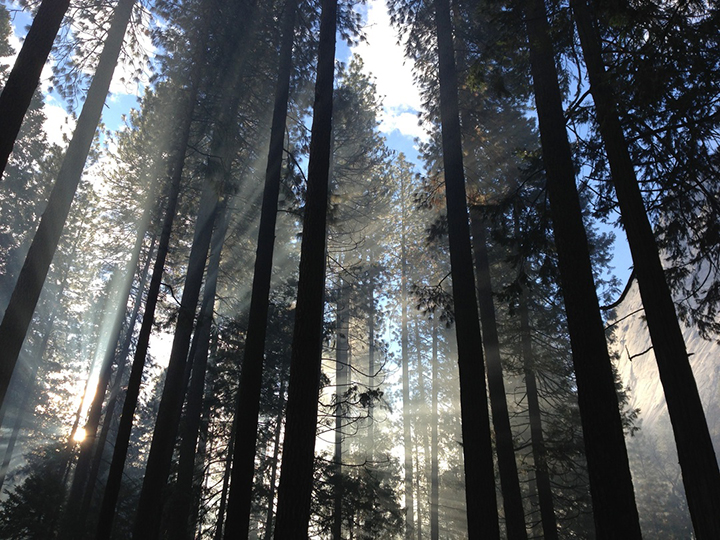Shira Richman
Joanna wasn’t one to pray. Not until she found her husband, Bradley, in another woman’s kitchen, sitting on the counter, naked, one hand cuffed to an antique sconce above the sink. From that morning on she prayed each drive to work, each evening walk, before dinner, before sleeping, and also in-between. She was asking God for peace, grace, guidance, and meaning.
This went on until a good friend said, “Praying is talking to God, but meditating is listening.” Joanna imagined God had better things to say than she did, so she tried to meditate. She did just as the CD from the library suggested. First she discovered her ideal scent, seat, scene trio: freshly peeled Clementines, a Fatboy beanbag from Target, and the image of bare winter trees blowing in the wind.
Despite the frigid wind in the forest of her mind, a few days into her meditation she began to feel a warm tingling across her forehead. This was undeniably the breath of God. Friends said, “You’ve got a proclivity for the spiritual,” and, “Your forehead is a portal to the universe.”
A few more weeks and her sitting sessions yielded a visual dialogue.
She offered the image of eating burritos on the couch with Bradley while watching the evening news. God added gauze, wrapped round her head and headphones to Bradley that leaked Black Sabbath.
She offered an image of herself at a podium giving a speech. God added egg yolks splattered on her crimson velvet blazer.
To the vision of her in a classroom writing, “If music be the food of love,” on the chalkboard, God added a closet around her, a group of kids holding the door closed and laughing while perusing the contents of her purse.
God embellished her car chase on the highway by careening her cop car off a cliff. God took the girl listening to bedtime stories off of Joanna’s lap and threw her to the floor where all the child would do was roll around, moan, and occasionally throw a book at Joanna’s head.
“Retarded or autistic?” she asked. God simply nodded Joanna’s rocking chair.
Joanna was beginning to question God. Did he want anything for her? Did he even have a plan?
She pictured herself at the reception desk of the tool manufacturing company where she worked. God added a smile to her face. To a picture of her writing appointments in her boss’s schedule, God added a warm tone of sopranos singing “Ooooh,” bright as wet fingertips circling the rims of crystal goblets. To the image of her making photocopies, God added a rainbow that ended at the Xerox machine.
“Unbelievable,” a friend said. “Leave him. You clearly don’t need help from that kind of God.” She suggested running. “I get the clearest head when I’m exhausted but still moving, the river as my daily companion.”
Each thought Joanna tried to formulate while running broke off until her head was a jangling mess of shards. Over time, though, they softened, becoming more like marbles rolling around and occasionally knocking each other off course. One day when two hit hard enough to spark, she noticed a statue on the hill above the trail. It was an unpolished granite carving of a woman sitting on a boulder.
The woman was naked, her breasts hanging low, almost grazing her lap. Her arms were bent at the elbows, her palms facing the sky as if to say, “It’s only castles burning.” Her mouth was slightly open and her eyes squeezed shut. Most remarkably, however, was that her hair looked wispy, like it was blowing out from her face in a wild wind or a free fall. How the sculptor had created such fine strands from granite was the most mysterious part at first.
The rest of that day, Joanna hummed an old tune she couldn’t place. She wished she could type the melody into Google, but she didn’t know how. Instead, she went to George, the bar on the corner, and hummed a few bars for George.
“Blind man running through the light of the night / with an answer in his hand, / come on down to the river of sight / and you can really understand,” George sang, and soon a couple of spare guys sitting at the bar joined in:
Red lights flashing through the window in the rain,
Can you hear the sirens moan?
White cane lying in a gutter in the lane,
If you’re walking home alone.
Don’t let it bring you down.
At this point, Joanna began singing along, too:
It’s only castles burning,
Just find someone who’s turning
And you will come around.
They all repeated the chorus, with low and gravelly voices, out of tune ones, and Joanna’s own raspy alto.
“That song speaks to me,” Joanna said, almost not noticing how corny she sounded in the dimly lit, wood paneled room.
“That’s my man,” a drunk man with a cowboy hat said, holding up an empty tumbler.
George filled five shot glasses with whiskey and, as they each held theirs up, he said: “To Neil Young, who interprets the work of our hearts.”
Joanna, who’d taken a sip before George finished the toast, choked on her shot. “I hate Neil Young,” she said through spattering coughs. The other whiskey shooters just laughed before placing orders for the next round.
The next day as she ran by the statue, Joanna looked up at the stone woman’s empty hands. This time their openness seemed clearly to say, “Tell me why.” The rest of the day Joanna had a new tune stuck in her head, this time one much more beautiful than the one the day before. She tried typing “Tell me why” into Google. Taylor Swift and the Back Street Boys topped the results list.
“Oh, my,” she gasped. “What’s happened to my taste?” She was relieved to find that the tune didn’t match songs by Swift or the BBBs. She added “Neil Young” to her search, and found him there, on her dusty computer screen, wispy haired and singing the most beautiful song she’d ever heard.
Her guitar was still under the bed, where she’d shoved it almost a decade ago. The dust was so thick and gunky it was more like papier-mâché. Sure enough, inside her guitar case, was a Neil Young songbook. She had liked him—before Bradley and his preference for metal.
She tuned her guitar and let her fingers remember what they could. They strummed a chord progression and a tune soon followed. The rest of the day she sang, “I’ve been waiting for you / And you’ve been coming to me,” and wondering if the granite woman would know this one. But the next day on her run, Joanna couldn’t remember the song she’d been singing for the statue. Nor did the stone woman offer any words. Joanna stopped, not wanting to leave with nothing, and heard a hum like air teasing the top of a long-necked bottle. She took the note into her mouth and followed it to another. As she ran, the notes kept circling until they were colored with words and singing her into a new song.
Shira Richman has stories and poems published or forthcoming in TIMBER, Copper Nickel, Bayou, Third Coast, [PANK], the Los Angeles Review, and elsewhere. She has published interviews with Dorianne Laux, Lynn Emanuel, Prageeta Sharma, Tess Gallagher, and Fady Joudah in Willow Springs. Her interview with Jake Adam York can be found at The Volta. She lives in Bavaria, where she studies German and Germans.


